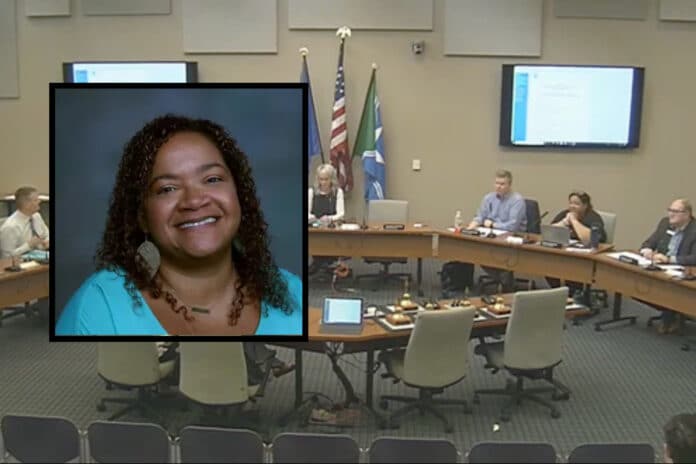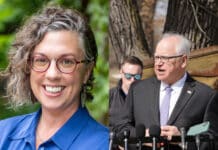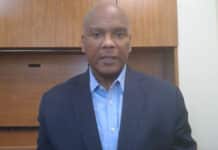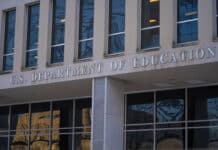
A black Mankato school board member said black people can’t be racist against white people in response to parents’ complaints about curriculum explaining white racism.
Erin Roberts, a Mankato school board member, said she can “prejudge based on her experiences” but denied she can be racist because she’s black. She defined racism as “prejudice plus power” in an email to a parent who questioned the use of a white supremacy pyramid in a 10th grade English class.
“With that definition, reverse racism is not possible,” Roberts wrote.
The white supremacy pyramid defines overt and covert or “socially acceptable” forms of racism. Lynching, hate crimes, and using the n-word are overt forms of white supremacy.
According to the pyramid, calling the police on black people, colorblindness, denying white privilege, saying “Make America Great Again,” believing in the “meritocracy myth,” and “claiming reverse-racism” are all forms of “covert” white supremacy.

“First, I really don’t understand why that was taught in my English class,” said a student who was in the class. She said she was offended and confused by the pyramid.
“We’re not racist and there were certain things on the triangle that don’t make you racist like calling police on black people. If someone is doing something wrong, it’s just fair to call the police no matter what color they are. Making me feel guilty about being white isn’t cool,” she said. “I think they could’ve done a better job.”
When confronted with complaints, Roberts claimed that she “cannot be racist towards white people.”
“I can say that I can make a prejudgment based on my past experiences that may not always be true. I also can say that doesn’t stop me from having experiences with that person and learning for myself,” she said.
Elizabeth Hanke, a Mankato resident and parent, formally challenged the approved curriculum last fall. She said promoting “discrimination as education is dangerous.”
Hanke said she initially got little to no response when she voiced her concerns to the district and was eventually told in a letter from a curriculum evaluation committee that the pyramid met the standards for use in classrooms.
Rochester parent Brittany Kressin joined the fight last month after learning about the pyramid and emailed Mankato school board members.
“No wonder test scores are so low,” Kressin wrote in her email. “This is teaching our future generation that it is impossible to be racist toward the Caucasian race. This is an incredibly dangerous idea that effectively dehumanizes the Caucasian race. Anyone teaching this curriculum is complicit in the growing hatred aimed directly at Caucasian people.”
Kressin said teachers are allowed to introduce “radical ideas” to children.
“I just don’t have trust for teachers anymore or administrators. It’s eroded,” she said. She plans to take her children’s schooling into her “own hands” and encouraged parents to look at alternatives.
Kressin said black people can be racist and she has experienced it personally. She said her goal is to help parents understand Roberts is not going to protect white children against racism.
She also called Roberts a “far left” board member who will not be able to put aside her own bias when making decisions for the district.
“We need more moderate people to fill these positions,” Kressin said.
Roberts articulated her positions on the claims made in the white supremacy pyramid in her email to Kressin.
“Color blindness takes away the identity of individuals,” Roberts wrote. “And it doesn’t exist unless you are in fact blind or color blind. When you see me, you see a black woman. That is a fact. I want you to see me as a black woman. I don’t want to be seen as the same as someone else.”
In relation to white privilege, Roberts said white people are not “at fault living within this era.”
“It is what it is,” she wrote. “It’s the denial of it that makes it wrong. White skin will never get in the way of anything. White skin will never be the reason someone doesn’t get a job or work harder for a grade in school. That is not the case for BIPOC individuals.”
Roberts also indicated the slogan “Make America Great Again” is an “indirect racist remark.”
“[I’m] not saying everyone who uses that slogan is meaning it in that way but my experience has been that. And I’m sure we have BIPOC students who have experienced the same,” she wrote. “As in America was better with slavery, Jim Crow, etc. So when I hear that, I hear you want me to be a slave or not have equal access like my white peers.”
“What parents are choosing not to see is that they are literally throwing their children to the wolves when they put them in public school. There are other options,” Kressin commented.
Alpha News reached out to Roberts and Superintendent Paul Peterson, but they did not respond in time for publication.
Sheila Qualls
Sheila Qualls is an award-winning journalist and former civilian editor of an Army newspaper. Prior to joining Alpha News, she was a Christian Marriage and Family columnist at Patheos.com and a personal coach. Her work has been published in The Upper Room, the MOPS blog, Grown and Flown, and The Christian Post. She speaks nationally on issues involving faith and family.














